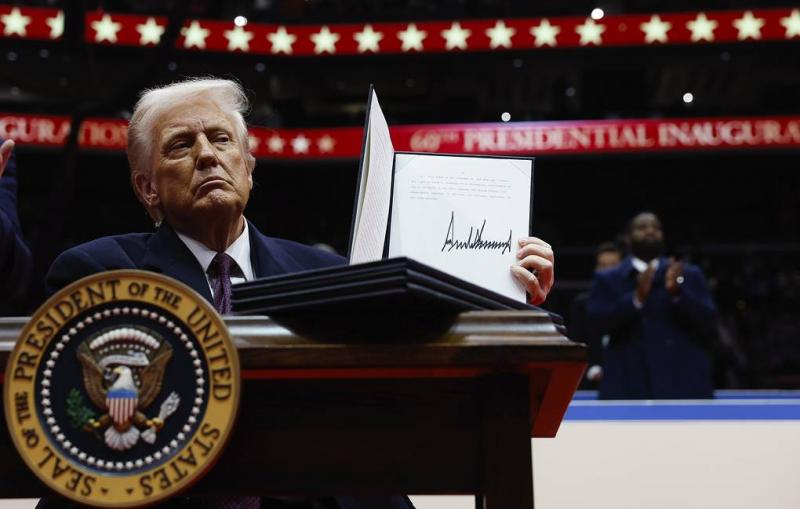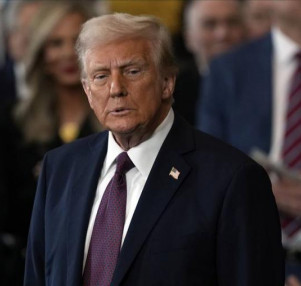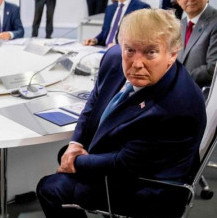
US President Donald Trump has announced a more than tenfold increase in import duties on all the cars manufactured outside the United States starting April 2. The decision will backfire all across the globe, affecting not only car manufacturing nations, but also companies that produce numerous components for the American automotive industry — engines, gearboxes, transmission components, and more. A huge volume of imports falls under the clampdown. In total, official statistics shows that in 2024, imports of cars and components to the United States amounted to $474.3bn.
A White House official said that increased tariffs mean that the new ones will be up by 25 percent, i.e. added in the existing ones, and so the total figure will be 27.5 percent for passenger cars and 50 percent for light trucks. As for key automotive components, the Trump-signed decree stipulates a one-month respite until May 3.
"We’re going to charge countries for doing business in our country and taking our jobs, taking our wealth, taking a lot of things that they’ve been taking over the years," Trump told reporters in the Oval Office. "They have taken a lot from our country, both friends and foes. And, to be honest, friends were often much worse than foes."
Trump said he would keep the new passenger car tariff in place for his entire presidential term so as to revitalize domestic production, attract more investment to the United States and make tax revenues grow by more than $100 billion a year. "I think our automobile business will flourish like it’s never done before," he stressed.
The new US administration expects that customs revenues enhanced owing to new import duties will be a means to combat the US budget deficit, retaining the tax breaks introduced by Trump during his first term in office. In the future, this should be an incentive to move car production to the United States, which would increase the taxable base and the number of jobs.
Out of the approximately 16 million new vehicles sold in the United States throughout 2024, about 50 percent were imported, a White House official said, adding that of the remaining 8 million vehicles, more than half were assembled with foreign components. That is, only a quarter of cars sold in the US were fully American-made. He complained that the country, once an industrial power, has turned into a place where cars are simply assembled.
That said, the United States has actively encouraged car production transfer to the United States. In particular, the Inflation Reduction Act (IRA) provides for tax breaks and subsidies to battery and e-vehicle manufacturers. Companies investing in domestic production are entitled to get tax breaks of up to 30 percent on costs associated with manufacturing batteries. At the local level, states such as Georgia, Tennessee, and Kentucky offer tax breaks, preferential land plots, and grants to automakers building factories in their territories.
In this regard, Volkswagen has been considering production transfer for certain Porsche and Audi models to the United States in order to avoid high import duties. The company particularly plans to expand its plant in Chattanooga, Tennessee, where Volkswagen ID.4, Atlas, and Atlas Cross Sport are already produced. Investment in expansion is expected to amount up to $2bn, with production of new models beginning in 2026-2027.
The Germans are shocked, but major "victims" are still going to be Japanese and South Korean automakers, along with their American competitors who manufacture a significant part of their cars outside the United States or purchase components abroad.
Japan is the first to get under blow. Last year, it exported over $40bn worth of cars to the United States, accounting for 28.3 percent of the country’s total exports to America.
Mexico will also sustain significant damage as many automakers have set up assembly plants there owing to local cheap labor. As a result, the country has become the largest vehicle exporter to the United States. Official statistics from the US Department of Commerce suggests that the number of cars imported from there has been 2.96 million. Second comes South Korea with its 1.54 million, Japan with 1.38 million, and Canada with 1.07 million.
Judging by reports coming from the White House, the legal basis for imposing additional tariffs on cars is an investigation conducted under Section 232 of the 1962 Trade Expansion Act during Trump's first term. The POTUS used the law to study car imports in 2019 and concluded that the number of foreign-made vehicles imported into the country undermined US national security. However, he did not impose additional duties — partly due to the COVID-19 pandemic, which generated major supply chain issues worldwide. Now, nothing seems to be standing in Trump’s way anymore.
There are true concerns that the current measures could lead to higher car prices in the United States. Thus, The Washington Post, citing industry experts, warns that the increase in the average cost of cars purchased by the Americans may increase from $50,000 to $60,000 to "hit" consumers even harder amid accelerating inflation.
But so far, exporting countries seem more concerned in this regard.
The US government's practice of imposing extra tariffs runs counter to WTO rules and damages the global trading system. A statement to that effect came at a briefing by Chinese Foreign Ministry spokesman Guo Jiakun.
The Japanese government will explore every option for responding to Washington's 25-percent car import tariff increase, the country's Prime Minister Shigeru Ishiba told the parliament. The PM stressed that "Japan has made significant investments in US economy and significant job creation." "Japan invests in the United States the most, so we think whether the United States really should take the same approach to all the countries," the Prime Minister added.
Meanwhile, Japanese experts are sure that the US will keep buying premium Japanese brands, while sales of simpler cars may drop essentially. Meanwhile, Toyota alone sells over one million vehicles per year in the United States. It is not clear what to do with them in case of plunging demand.
Politico notes that over a fifth of European car exports has the United States as its destination. US tariffs may cause particular damage to Germany, Italy, Hungary, and Poland. The EU car industry is already in a crisis amid low sales and potential competition offered by PRC’s cheaper cars. And Trump's tariffs may overwhelm the European automotive industry altogether.
The reaction of European and Asian business circles to the latest US decision is not yet clear, but what can be said for sure is that Trump will hardly hereby cultivate more friends or well-wishers.
Anticipating any flutter among the allies and competitors, he has posted the following on his Truth Social platform: "If the European Union works with Canada in order to do economic harm to the USA, large scale tariffs, far larger than currently planned, will be placed on them both."
Next to come new tariff hikes as regards medicines, copper, and so on down the list.









